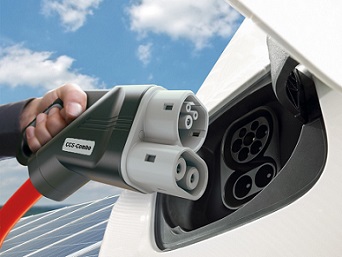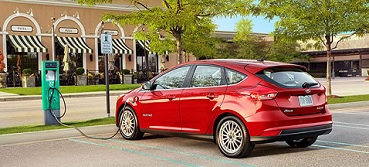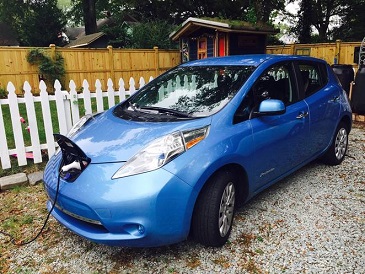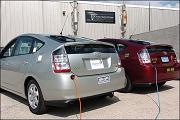

Ford Mustang Mach-E - Price: $43,895
Tesla Model 3 - Price: $37,990
Nissan Leaf - Price: $31,600
Chevrolet Bolt EV - Price: $36,620
 CHEVROLET BOLT ELECTRIC CAR Every Reason to Drive Electric, 238 Miles Per Charge, Voted Green Car of the Year by Green Car Journal
CHEVROLET BOLT ELECTRIC CAR Every Reason to Drive Electric, 238 Miles Per Charge, Voted Green Car of the Year by Green Car Journal
 FIAT 500E All Electric Car with Zero Emissions - Ugliness is the Worst Form of Pollution
FIAT 500E All Electric Car with Zero Emissions - Ugliness is the Worst Form of Pollution
 HARLEY-DAVIDSON LIVEWIRE
Electric, 146 Miles City Range, 0 TO 60 IN 3 Seconds
HARLEY-DAVIDSON LIVEWIRE
Electric, 146 Miles City Range, 0 TO 60 IN 3 Seconds
 HONDA FIT EV
100% Electric Features Cutting-Edge Technology like a 20kWh Lithium-Ion Battery. 118 MPG
HONDA FIT EV
100% Electric Features Cutting-Edge Technology like a 20kWh Lithium-Ion Battery. 118 MPG
 HYUNDAI KONA EV All-Electric Subcompact SUV and 2019 North American Utility Vehicle of the Year, with an EPA-Estimated Range of 258 Miles.
HYUNDAI KONA EV All-Electric Subcompact SUV and 2019 North American Utility Vehicle of the Year, with an EPA-Estimated Range of 258 Miles.
 JAGUAR ALL-ELECTRIC I-PACE SUV One full charge provides a range of up to 240 miles.
JAGUAR ALL-ELECTRIC I-PACE SUV One full charge provides a range of up to 240 miles.
 KIA NIRO EV EPA-Estimated 239-Mile Range1. Power up when you Slow Down by Capturing the Kinetic Energy of Deceleration to Charge Your Battery
KIA NIRO EV EPA-Estimated 239-Mile Range1. Power up when you Slow Down by Capturing the Kinetic Energy of Deceleration to Charge Your Battery
 LIGHTNING MOTOCYCLE
The Fastest Production Electric Motorcycle in the World - Gas or Electric
LIGHTNING MOTOCYCLE
The Fastest Production Electric Motorcycle in the World - Gas or Electric
 LUCID MOTORS Offical EPA Range up to 520mi Max Power 1,111 hp
LUCID MOTORS Offical EPA Range up to 520mi Max Power 1,111 hp
 NIKOLA MOTOR COMPANY Zero-Emission Hydrogen-Electric Commercial Semi Truck
- 6 Electric Motors - 2,000 hp - 1,200 Miles Before Needing a Hydrogen-Electric Fill-Up.
NIKOLA MOTOR COMPANY Zero-Emission Hydrogen-Electric Commercial Semi Truck
- 6 Electric Motors - 2,000 hp - 1,200 Miles Before Needing a Hydrogen-Electric Fill-Up.
 NISSAN LEAF World's Best Selling Electric Car, EPA range 200 Miles
NISSAN LEAF World's Best Selling Electric Car, EPA range 200 Miles
 PROTERRA
World's Most Fuel-Efficient Battery Electric Bus, Zero-Emission Commercial Vehicle Solutions
PROTERRA
World's Most Fuel-Efficient Battery Electric Bus, Zero-Emission Commercial Vehicle Solutions
 TESLAR MOTORS Zero Emissions, Zero Compromises 300 MPG. The World's First Premium Electric Sedan
TESLAR MOTORS Zero Emissions, Zero Compromises 300 MPG. The World's First Premium Electric Sedan
 URBANSCOOTERS.COM ELECTRIC SCOOTERS An Excellent Eco-Friendly Alternative for Local Travel and Your Commute
URBANSCOOTERS.COM ELECTRIC SCOOTERS An Excellent Eco-Friendly Alternative for Local Travel and Your Commute
 VOLKSWAGEN ID-4 Manufacturer Estimated Range for ID.4 Pro S and 1st Edition
250 miles Estimated Charging Time 60 miles in about 10 minutes
VOLKSWAGEN ID-4 Manufacturer Estimated Range for ID.4 Pro S and 1st Edition
250 miles Estimated Charging Time 60 miles in about 10 minutes
"In 15 years, I suspect every car on the road will be electric" - Richard Branson
MotoTec MAD 1600w Electric Scooter


Fast-Charging EV Network

TESLAR
PROTERRA
Winnebago Electric RV Camper Van JAGUAR ALL-ELECTRIC I-PACE SUV
PROTERRA CATALYST - EXTENDED RANGE ZERO EMISSIONS

Lucid Motors

Toyota Solar-Powered Electric Car
Maximum Performance - Maximum Range


NIKOLA ONE - 2,000 hp Hydrogen-Electric Commercial Semi Truck

NEW FLYER INDUSTRIES - ELECTRIC BUS



2 Prius Plug-In
Worldwide plug-in electric vehicle sales grew 50% in the first half of 2016, compared to the first half of 2015. Plug-in car sales growing 10x faster than gas-powered cars.
Battery Electric Vehicles (BEV)
Battery Electric Vehicles, also called BEVs, are fully-electric vehicles with rechargeable batteries and no gasoline engine. They completely omit harmful emissions and hazards caused by traditional gasoline-powered vehicles.
BEV Examples: Nissan LEAF BMW i3 Ford Focus Electric Volkswagen e-Golf Tesla Model S
Hybrids
A plug-in hybrid can save more than the green on our Earth-it can save green in your wallet, too. A Google project called RechargeIT calculates the savings this way: The average American car gets 19.8 miles per gallon and drives about 12,000 miles per year. At $3 a gallon for gasoline, that adds up to $1,818 per year on fuel. If, as RechargeIT found, a plug-in hybrid gets 73.6 mpg, the total cost for electricity plus gas comes to $616 per year, a saving of $1,202. (This calculation does not account for the cost of the conversion kit -- roughly $10,000. Prices should fall with increasing volume.
What is biodiesel?
Biodiesel is the name of a clean burning alternative fuel, produced from domestic, renewable resources. Biodiesel contains no petroleum, but it can be blended at any level with petroleum diesel to create a biodiesel blend. It can be used in compression-ignition (diesel) engines with no modifications. In fact diesel engines run better and last longer with biodiesel. And it can easily be made from a common waste product -- used cooking oil. Biodiesel is simple to use, biodegradable, nontoxic, and essentially free of sulfur and aromatics.
* Biodiesel fuel burns up to 75% cleaner than conventional diesel fuel made from fossil fuels
* Biodiesel substantially reduces unburned hydrocarbons, carbon monoxide and particulate matter in exhaust fumes
* Sulphur dioxide emissions are eliminated (biodiesel contains no sulphur)
* Biodiesel is plant-based and adds no CO2 to the atmosphere
* The ozone-forming potential of biodiesel emissions is nearly 50% less than conventional diesel fuel
* Nitrous oxide (NOx) emissions may increase or decrease but can be reduced to well below conventional diesel fuel levels by adjusting engine timing
* Biodiesel exhaust is not offensive and doesn't cause eye irritation (it smells like French fries!)
* Biodiesel is environmentally friendly: it is renewable, "more biodegradable than sugar and less toxic than table salt" (US National Biodiesel Board)
* Biodiesel can be used in any diesel engine
* Fuel economy is the same as conventional diesel fuel
* Biodiesel is a much better lubricant than conventional diesel fuel and extends engine life -- a German truck won an entry in the Guinness Book of Records by traveling more than 1.25 million km (780,000 miles) on biodiesel with its original engine
* Biodiesel has a high cetane rating, which improves engine performance: 20% biodiesel added to conventional diesel fuel improves the cetane rating 3 points, making it a Premium fuel
* Biodiesel can be mixed with ordinary diesel fuel in any proportion -- even a small amount of biodiesel means cleaner emissions and better engine lubrication: 1% biodiesel will increase lubricity by 65%
* Biodiesel can be produced from any fat or vegetable oil, including waste cooking oil.
Summary:
* The overall ozone (smog) forming potential of biodiesel is almost 50% less than diesel fuel.
* Sulfur emissions are eliminated.
* Substantial reductions of unburned hydrocarbons (-93%), carbon monoxide (-50%), and particulate matter (-30%).
* Biodiesel NOx emissions can be efficiently eliminated as a concern.
* Substantial reductions of cancer-causing PAH (-80%) and nitrited PAH compounds (-90%). Diesel emissions and cancer According to a U.S. Department of Energy study completed at the University of California at Davis, the use of pure biodiesel instead of petroleum-based diesel fuel could offer a 93.6% reduction in cancer risks from exhaust emissions exposure. Greenhouse effect Using vegetable oils or animal fats as fuel for motor vehicles is in effect running them on solar energy. All biofuels, including ethanol, are derived from the conversion of sunlight to energy (carbohydrates) that takes place in the green leaves of plants. Official Biodiesel is recognized by both the US Environmental Protection Agency and Department of Energy as an alternative fuel, and qualifies for mandated programs under the Clean Air Act Amendments and the Environmental Protection Act of 1992 (EPAct). In California, biodiesel has been approved for use in remediation of petroleum oil spills.

IN-HOUSE RESOURCES